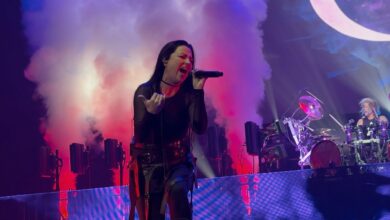AC/DC’s “Hells Bells” in Melbourne Was So Powerful It Shook the Earth and Became an Instant Rock Legend
On November 12, 2025, the Melbourne Cricket Ground morphed from a world-famous sports arena into a roaring monument of pure rock power as AC/DC returned home for the first time in a decade. Even before the first guitar string vibrated, nearly 80,000 fans flooded the grounds—spanning generations, outfits, and accents—each one carrying the same electric anticipation. Parents arrived wearing sun-bleached shirts from tours in the ’80s and ’90s, teens showed up in freshly printed merch, and longtime devotees walked in with expressions that said they were about to witness something they had waited years to feel again.
The day had already taken on a celebratory spirit across Melbourne. Earlier in the afternoon, Federation Square was overtaken by hundreds of bagpipers blasting “It’s a Long Way to the Top (If You Wanna Rock ’n’ Roll)” in a citywide tribute to the band. Fans spilled from the scene toward the MCG, still buzzing from the spectacle. By the time they reached the stadium gates, it felt like AC/DC had retaken their city—not through marketing or billboards, but through the collective pulse of thousands of people ready for history.
Inside the MCG, the sheer scale of the stage pushed the venue into architectural spectacle. Towering steel structures, enormous LED screens, pyro cannons, and seemingly endless lighting rigs rose across the ground like a glowing industrial skyline. The pre-show hum became a physical presence: waves of cheers, chants, and whistles rolling and collapsing like thunder echoing through the structure. Every time the stadium lights flickered or dimmed slightly, 80,000 people erupted, thinking the band was about to walk out.
Then the lights dropped for real, and the eruption that followed was volcanic. AC/DC launched into “If You Want Blood (You’ve Got It)” before the crowd had time to blink, and the MCG instantly became a shaking, screaming sea of bodies. Angus Young stormed the stage in full schoolboy uniform, duck-walking like no time had passed, while Brian Johnson marched forward, voice gritty, powerful, and unmistakably his. Fans strained forward, waiting for the first line—and Brian hit it with such force that thousands of people screamed in relief and triumph.
From there, the band fired through a relentless barrage of classics. “Demon Fire” cracked through the stadium with ferocity, “Shot Down in Flames” kept the energy spiking, and “Thunderstruck” turned the entire MCG into the world’s loudest choir. Tens of thousands belted the signature “thun-der!” chant with such unified force that the ground seemed to vibrate beneath their feet. The rhythm section played with mechanical precision—tight, unfussy, unstoppable—while Stevie Young hammered out Malcolm’s iconic right-hand rhythms with reverence and steel.
Then the mood shifted. The lights dipped into a deep, hazy blue as the band eased into “Have a Drink on Me,” and every fan who knew the tour’s setlist felt the electricity change. Phones lifted. The air thickened. Everyone knew what was coming.
The stadium went black.
A spotlight hit the rafters.
And slowly—almost ceremonially—a massive black bell descended from above, glowing with a red AC/DC emblem.
The roar that followed shook the stadium to its core.
This was “Hells Bells.”
The first toll of the bell rolled across the MCG like a thunderclap—heavy, metallic, echoing. People physically flinched, then burst into screams. The entire stadium froze, mesmerized, as the bell continued to toll. And beneath it, Angus crept into the sinister opening riff, hunching over his guitar like a man channeling electricity straight into the ground.
Brian Johnson stepped into the verse, not trying to sound like he was 32 again, but leaning into the rugged weight of his voice. The lyrics landed differently—sweatier, heavier, more lived-in—like a man pouring four decades of experience into every line. Fans stayed quiet for key moments just to hear him snarl, saving their voices for the soaring choruses.
Meanwhile, Angus crafted one of the most gripping performances of the night. During the mid-song break, he stalked the stage in near-silence, stretching every bend with excruciating tension, teasing the crowd into shrieks with each flick of his fingers. Under the glow of the massive bell, “Hells Bells” felt less like a song and more like a rite.
Then, as if detonated by divine mischief, the lights exploded into blazing orange. Without warning, the band launched into “Highway to Hell.” The stadium went nuclear. People in the back stands stood on chairs, arms over strangers’ shoulders, shouting every word like a national anthem. The transition from “Hells Bells” into “Highway to Hell” was so overwhelming that many fans later said they briefly forgot to record anything—they were too busy screaming.
The night kept stacking moments of pure shock and delight. When Angus kicked into “Jailbreak”—a song they hadn’t played in more than three decades—the stadium was stunned for a full second before exploding into some of the loudest cheering of the night. Older fans nearly wept. Younger fans looked around in disbelief as if they’d been handed a piece of rock-music mythology.
@sarahs.life91 ACDC Melbourne 12/11/2025 packed stadium! #ACDC #acdc ♬ original sound – Sarah's Life
@theworldisntenough AC/DC live in Melbourne 2025 – Hells Bells – AC/DC – Opening Show POWER UP AUSTRALIA Tour 2025 – Melbourne Cricket Ground – 2025/11/12 #acdc #powerup #hellsbells ♬ original sound – TheWorldIsntEnough
Production throughout the show was colossal but tasteful. Flames erupted during key riffs, fireworks crowned the stage arches, and the giant screens seamlessly blended close-ups of fingers on frets with sweeping helicopter-style shots of 80,000 bodies moving together. Angus’s marathon solo during “Let There Be Rock” had a handheld, documentary feel as cameras chased him along the runway, capturing him spinning, collapsing backward, and still shredding like he was born to run on adrenaline and amplifiers.
But one detail from the night instantly elevated it into legend:
AC/DC shook Melbourne so hard that earthquake detectors picked it up.
Seismometers located several kilometers away recorded low-frequency ground vibrations during the concert—specifically during the heaviest crowd-movement songs like “Thunderstruck,” “Hells Bells,” and “Highway to Hell.” The instruments picked up rhythms from thousands of fans jumping, stomping, clapping, and moving in sync with the band, creating a measurable seismic event. Residents in nearby suburbs even reported hearing and feeling the rumble, describing it as “a low, constant vibration you could feel in your chest.”
The readings weren’t enough to qualify as a natural earthquake—but they were strong enough to register as detectable seismic activity. The city shook because AC/DC shook it.
And that became part of the show’s mythology within hours.
What ultimately made the night unforgettable wasn’t one single song or moment—it was the sense of coming home. When Brian introduced the band near the end, each name drew cheers, but Angus’s introduction hit with the force of a hometown hero returning after years away. The applause wasn’t polite. It was grateful. It was emotional.
After the final chords faded, fans poured out of the MCG still buzzing, still screaming, still high on adrenaline. Many debated which moment was the highlight: the first bell toll, the surprise “Jailbreak,” the wildfire energy of “Highway to Hell,” or the realization that the show had literally made the earth move.
But most people agreed:
The moment the giant bell descended, glowing red…
the moment “Hells Bells” thundered into the night…
that was when Melbourne stopped being a city and became the epicenter of rock.
On that cold November evening, AC/DC didn’t just perform.
They shook the ground.
They shook the crowd.
They shook Australia.
And for two electrifying hours, rock and roll was not just alive—
it was seismic.
Related :





